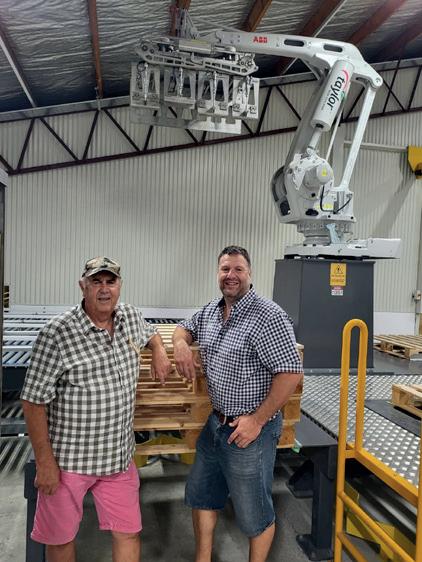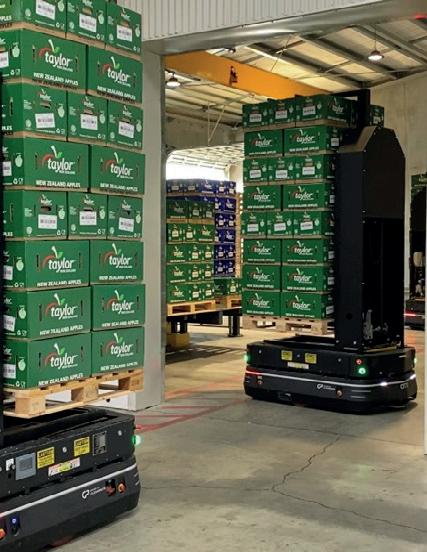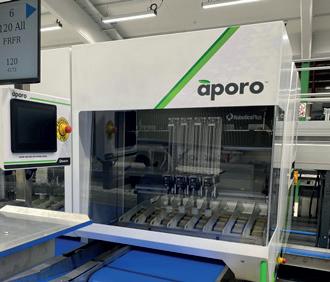
4 minute read
Consistency at the core
The unassuming appearance of Taylor Corp heads Kelvin Taylor and son Cameron might lead you to believe they’re pretty relaxed about how they do business. But at the heart of their hugely successful growing and export enterprise – Farmlands’ largest apple-growing shareholder – sits a commitment to quality, fierce protection of the Taylor brand and tremendous investment in emerging technology. All with a firm focus on family.
Kelvin Taylor’s route to the massive export markets of Asia began in the early 1960s, following in the applegrowing footsteps of his father Wally and grandfather Walter. Kelvin had worked on-farm before leaving school but he knew he didn’t want to work for anyone else. The idea of autonomy was already a driving force behind his decisionmaking. One bit of dirt, bought from the proceeds of a car sale, then another and another helped Kelvin establish his own orchard. Soon he was able to build his own packing shed and start packing his dad’s apples. Again, a man in control of his own destiny. Apart from the grip of the New Zealand Apple and Pear Board. “ENZA controlled everything back in those days, which we didn’t like,” Kelvin says, “and then when deregulation came – which meant we could sell our own apples – well, that was the best day in our lives. “We just wanted to be totally integrated. Grow our own trees, have our own apples, pack them and then export them to the markets ourselves.” What association with ENZA did give was an opportunity for Kelvin to travel the world, building relationships and demand for a quality product. “When the world opened up [postderegulation], we didn’t have to go out hunting for people to buy our apples, they approached us and we made sure that it was all good fruit wherever we sent it.” The number of customers isn’t an issue either. Across China, Taylor Corp’s strongest export destination, there are only about four or five buyers the company deals with and all are family-run businesses. “When we travel, the whole family comes out to dinner with us. It’s the same when they come over here. We’re one big family and you build a lot of trust from that,” Kelvin says. Alongside skyrocketing shipping costs and inflation, Taylor Corp has faced a lack of available RSE workers. The 20/21 financial year was tough across the board, with just 2,000 workers arriving in New Zealand from across the Pacific, the lowest number of arrivals since 2007. This meant that in 2021, 95 percent of the Taylor Corp packhouse and orchard was staffed by people new to the business.
Cameron Taylor
| Kelvin Taylor and son Cameron amid the packhouse technology that has helped them cope with labour shortages.

“This was a really tough time for us. We pride ourselves on being a great place to work,” Cameron says. “Building confidence back up out there without your old hands is a big ask. Learning from experience and instilling a sense of pride in what you do doesn’t happen overnight.” The staffing situation has been helped by the introduction of new technology on 14 of the 40 packhouse lines. Working alongside the self-driving forklifts (OTTOs) are a new addition to the Taylor family, the Āporo. These machines can sort 120 pieces of fruit a minute and turn the fruit so that stems and colour are consistent for every tray. This drive for consistency has also kept the Taylors to one packhouse. “You try and run two packhouses and have consistent brand, it’s extremely hard. What you think is right as a manager might differ from the other house,” Cameron says. Kelvin chips in: ”That’s the reason we don’t run a night shift either. Most of the main staff are working 10-12 hours a day and if you put another shift in, you just don’t get that consistency.” The Taylors are a hard-working but caring bunch, with strong ideas on how to run a tight ship. They’re not averse to trying something new or reaching into different markets. But as it’s their name on the product, it’s always the family reputation on the line. Perhaps that’s the secret to their success.



FRUIT FRAUD
For a company built on trust and consistency, the spectre of fruit fraud is real. Usually more common in luxury goods, fruit fraud is a big problem worldwide. “We have the best [apple] brand in Asia, there’s no question about it and everyone’s trying to copy us. The only saving grace is that they’re putting good fruit into those counterfeit boxes,” Kelvin says. The practice is widespread, with New Zealand packhouses exporting product without identification and a Taylor label being applied at the other end. It’s not limited to New Zealand either. Australian growers face the same issue and many have thrown millions of dollars at it to no end. “It’s a balancing act,” Cameron says, “because our customers do pay a premium for our fruit. So we do engage with lawyers on the issue to show we’re trying to stamp out the problem. It’s an uphill battle though.”








